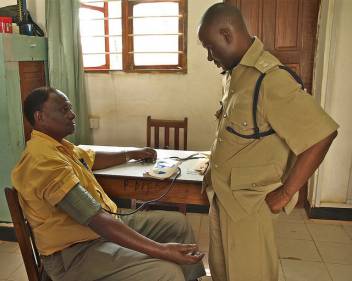Peter Lloyd-Sherlock is a Professor in Social Policy and International Development at the University of East Anglia.
 Why even bother with a World Stroke Day, which is marked today, when the world’s attention is now entirely focused on the perils of Ebola? The current panic is unhelpful, but understandable.
Why even bother with a World Stroke Day, which is marked today, when the world’s attention is now entirely focused on the perils of Ebola? The current panic is unhelpful, but understandable.
The Ebola epidemic will escalate over the coming weeks and months, and the worst-case scenarios are truly frightening.
Hopefully, the Ebola crisis might be a wake-up call for the global community to invest in the underlying causes of the epidemic: many countries’ woefully inadequate infrastructure and health facilities.
Preventable disease remains a fact of life
Instead, the preferred response is likely to be the parachuting in of emergency medical teams who leave once the immediate problem appears to be solved.
Poor health and preventable disease will remain a fact of life for the people left behind, but then these things do not directly threaten the interests of wealthier countries.
Most people assume that the main causes of death and illness in regions like West Africa are other infectious conditions, such as malaria, TB or HIV and AIDS.
High blood pressure: a silent killer
In fact, the situation is changing fast. The World Health Organization estimates that high blood pressure, for which simple and cheap treatments already exist, already kills around 300,000 people in West Africa each year, mainly due to strokes and heart disease.
Awareness of high blood pressure, sometimes called hypertension, and access to effective treatment is extremely limited in poorer countries. A recent study found that in Ghana, only 4% of people with hypertension were effectively managing their condition (Lloyd-Sherlock, et al, 2014).
Challenge of hypertension
Today HelpAge International has published a policy brief which sets out the scale of the hypertension challenge for low- and middle-income countries.
Among other things, it shows:
- Hypertension is the leading cause of death and disability for older people in developing countries.
- Poor older people living in rural settings are particularly at risk of strokes, heart disease and other serious illness caused by hypertension, since they are less likely to manage their condition.
- Less than one in ten older people with hypertension are taking effective treatment.
- Treatment for hypertension is simple and affordable, but continues to receive a low priority among development agencies and national governments.
The reluctance of the global community to face up to the challenge of strokes and hypertension in poorer countries is no less a public health scandal than the failure to nip Ebola outbreaks in the bud.
Download the paper “Hypertension and older people” (303kb).
Read more about our work on non-communicable diseases.
References:
Lloyd-Sherlock, P., Minicuci, N., Beard, J., Ebrahim, S. and Chatterji, S. (2014) “Hypertension among older adults in low and middle income countries: prevalence, awareness and control” International Journal of Epidemiology 14(1):116-128.
World Health Organization (WHO) (2009). Global health risks: mortality and burden of disease attributable to selected major risks. WHO, Geneva. http://www.who.int/healthinfo/global_burden_disease/GlobalHealthRisks_report_full.pdf
